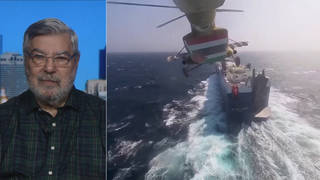
Guests
- William Hartungdirector of the Arms and Security Project at the Center for International Policy. His latest book is Prophets of War: Lockheed Martin and the Making of the Military-Industrial Complex.
Does President Trump stand to personally profit off the wars he is escalating in Iraq, Yemen, Syria, Somalia and beyond? That’s the question many are asking, after it emerged that Trump has personally invested in Raytheon, the military contractor who makes the Tomahawk missiles used in the U.S. strike on a Syrian airbase last week. Raytheon’s stocks briefly surged after the attack. Overall, the stocks of defense contractors, such as Boeing and General Dynamics, have increased since Trump’s election, further fueled by his promise of a “historic” 10 percent increase in U.S. military spending. For more, we speak with William Hartung, director of the Arms and Security Project at the Center for International Policy. His latest book is “Prophets of War: Lockheed Martin and the Making of the Military-Industrial Complex.”
Transcript
JUAN GONZÁLEZ: On Friday, the stock price of the military contractor Raytheon briefly surged after the U.S. attack on a Syrian airbase, which used 59 of the company’s Tomahawk missiles, estimated to cost $1.4 million apiece. While the stock surge was brief, it called attention to the fact that President Trump himself has held personally—has been personally invested in Raytheon in the past. A 2015 Federal Election [Commission] disclosure, filed when Trump launched his presidential bid, reveals that he held Raytheon stocks worth $1,000 to $15,000 in value.
AMY GOODMAN: While the value is low, the revelations have raised additional questions about the lack of transparency in Trump’s financial holdings and the fact that he could potentially benefit from almost any military decision he makes as president. Overall, the stocks of military contractors, such as Boeing and General Dynamics, have increased since Trump’s election, further fueled by his promise of an “historic” tens of billions of dollars’ increase in U.S. military spending.
For more, we’re joined by Bill Hartung. He’s the director of the Arms and Security Project at the Center for International Policy. Latest book, Prophets of War: Lockheed Martin and the Making of the Military-Industrial Complex.
William Hartung, welcome back to Democracy Now!
WILLIAM HARTUNG: Thank you.
AMY GOODMAN: So, tell us, as those Tomahawk cruise missiles were pummeling this base, though not enough to take it out—it was immediately in use again—how did President Trump profit personally?
WILLIAM HARTUNG: Well, as far as we know, he may still have shares in Raytheon, as reported in his financial disclosure. Of course, as with all things Trump, there’s a black box here, because he’s not reporting his tax returns, he hasn’t done a blind trust. As you said, virtually anything he does, not just in the military sphere, could benefit him, his family, his inner circle financially. And the only way to deal with that is release the tax returns, that people have demanded, and have a true blind trust that’s not run by his family. But it’s—no question, it’s an outrage to have the commander-in-chief profiting from a military contract in the middle of a conflict, however small the amount may be. And the fact that he’s not willing to disclose his current position, in some ways, makes it even worse.
JUAN GONZÁLEZ: I wanted to ask you, in terms of this—the emphasis on military action that’s emerging in the first few weeks of the Trump administration—you wrote a piece for TomDispatch titled “Could War with Iran Be on Washington’s Agenda?” Could you talk about that?
WILLIAM HARTUNG: Sure. Well, there’s this sort of notion that, you know, the adults in the room are Mattis and McFarland—rather, McMaster, who are, you know, military people, they’ll be careful, they know the costs of war. But they’re also among the most hawkish generals of their generation. Mattis himself wanted to attack Iran during the Iraq War, which is one of the reasons—
AMY GOODMAN: This is “Mad Dog” Mattis, self-described.
WILLIAM HARTUNG: Yes, exactly, is his self-described moniker. And he, you know, in the middle of that war, actually left the administration, because he wanted to attack them at the very same time they were negotiating to limit Iran’s nuclear options. So, they’ve already stepped up in Yemen—more special forces, more airstrikes. They’re still arming the Saudis, who are killing thousands with civilian bombings. So, they see that as a strike against Iran. Of course, Iran is not the problem there, but their worldview says it is. And now the step up in Syria, of course, Iran is allies with Assad, so it’s another kind of potential strike at Iranian concerns. Now the question is: Will they go further? And I think there, you know, Iran would have many ways to respond—through nonstate actors, through missile strikes. It’s not a small country. You know, invading Iran would make the Iraq War look like a walk in the park. So, how are these military people going to address this? But there’s certainly a danger of some sort of military action. And, of course, they’re not going to telegraph it. I mean, Trump apparently decided this on rather short notice, if we’re to believe the accounts. He saw something on TV, and he got exercised.
AMY GOODMAN: You’ve got the advertisements on television, and then the news being an advertisement, as well, for these weapons contractors. Let’s turn to MSNBC’s Brian Williams the night of the Tomahawk cruise missile attack.
BRIAN WILLIAMS: Go into greater detail. We see these beautiful pictures at night from the decks of these two U.S. Navy vessels in the eastern Mediterranean. I am tempted to quote the great Leonard Cohen: “I’m guided by the beauty of our weapons.” And they are beautiful pictures of fearsome armaments making what is for them a brief flight over to this airfield. What did they hit?
AMY GOODMAN: I daresay Leonard Cohen might be rolling over in his grave and not rock 'n' rollin’.
WILLIAM HARTUNG: No question.
AMY GOODMAN: Bill Hartung?
WILLIAM HARTUNG: Well, you know, obviously, it’s obscene to worship weaponry, whoever it’s targeted at. And on Raytheon’s webpage, where they’re advertising the cruise missile, they have exactly the same kind of pictures. So, to have them on MSNBC and CNN is all the publicity money could buy and more. And, of course, this has happened before in wartime, and even in the first Persian Gulf War under Bush the elder, where these kinds of displays have upped the images of these companies and almost made the weapons seem benign. There’s all these things about how accurate they are and how they’re not going to hit civilians, which has been disproved almost uniformly in the history of U.S. intervention in the Middle East. So there’s that. And also it’s a question of how it’s going to affect Trump’s push for his military buildup, because he’s going to sort of posture as the wartime president. You know, as Fareed Zakaria said, much to his detriment, he’s now the president; he’s proved he’s the president, because he can launch a military strike—which, again, to me, is not what this country should stand for.
AMY GOODMAN: Bill Hartung, we thank you for being with us, director of the Arms and Security Project at the Center for International Policy.
That does it for our broadcast. I’ll be in Cambridge, Massachusetts on April 24th and 25th and moving on to Vermont, from Burlington to Montpelier, from Middlebury to Brattleboro. Check our website at democracynow.org.












Media Options